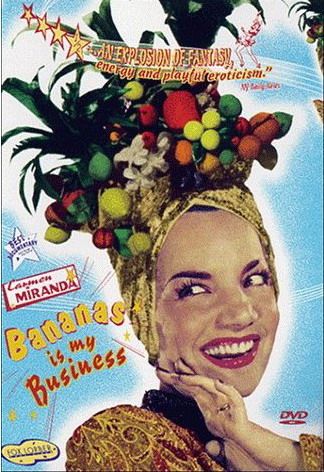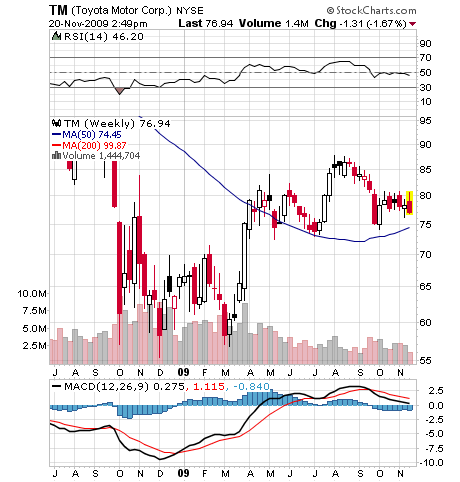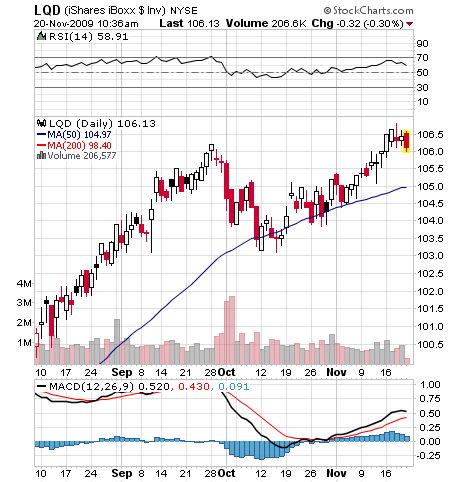November 24, 2009
November 24, 2009
Featured Trades: (PCY), (LQD), (TM),
(TM), (BEN BERNANKE)
2) Last September, I suggested emerging market sovereign debt ETF?s as safe, high yielding investments in which to hide out in case the equity markets swoon again (click here for the link). Well, the stock market hasn?t swooned yet, so let?s see how they performed. The Invesco PowerShares Emerging Market Sovereign Debt ETF (PCY), which has 40% of its assets in Latin American bonds and 31% in Asia, rose by a modest 3% before pulling back to unchanged. The two year old fund now boasts $340 million in market cap and pays a handy 6.20% dividend. This beats the daylights out of the one basis point you currently earn for cash, the 3.40% yield on 10 year Treasuries, and still exceeds the 5.38% dividend on the iShares Investment Grade Bond ETN (LQD), which buys predominantly single ?A? US corporates. The big difference here is that PCY has a much rosier future of credit upgrades to look forward to. It turns out that many emerging markets have little or no debt, because until recently, investors thought their credit quality was too poor. No doubt a history of defaults in Brazil and Argentina in the seventies and eighties is at the back of their minds. With US government bond issuance going through the roof, the shoe is now on the other foot. A price appreciation of 125% over the past year tells you this is not exactly an undiscovered concept. Still, it is something to keep on your ?buy on dips? list.

3) I managed to catch up with David Wessel, the Wall Street Journal economics editor, who has just published?? In Fed We Trust: Ben Bernanke?s War on the Great Panic. I doubted David could tell me anything more about the former Princeton professor I didn?t already know. I couldn?t have been more wrong, as David gave me some fascinating insights into the inner soul of our much vaunted chairman of the Federal Reserve.?? Bernanke was the smartest kid in rural Dillon, South Carolina, who, through a series of improbable accidents, ended up at Harvard. He built his career on studying the Great Depression, then the closest thing to paleontology economics had to offer, a field focused so distantly on the past that it was irrelevant. Bernanke took over the Fed when Greenspan was considered a rock star, inhaling his libertarian, free market, Ayn Rand inspired philosophy in great giant gulps. Within a year the landscape was suddenly overrun with T-Rex?s and Brontesauri. He tried to stop the panic 150 different ways, 125 of which were terrible ideas, the remaining 25 saving us from the Great Depression II. This is why unemployment is now only 10.2%, instead of 25%. The Fed governor is naturally a very shy and withdrawing person, and would have been quite happy limiting his political career to the local school board. But to rebuild confidence, he took his campaign to the masses, attending town hall meetings and meeting the public like a campaigning first term congressman. The price of his success has been large, with the Fed balance sheet exploding from $800 million to $2 trillion, solely on his signature. The true cost of the financial crisis won?t be known for a decade. Now that having pulled back from the brink, the biggest risk is that we grow complacent, and let desperately needed reforms of the system slide. How Bernanke unwinds this bubble will define his legacy. Too soon, and we go back into a real depression. Too late, and hyperinflation hits. That?s when we see how smart Bernanke really is.
?The whole US market is pretty much low quality these days,? said Richard Bernstein, of Bernstein Capital Management.






